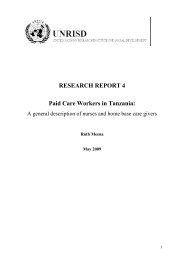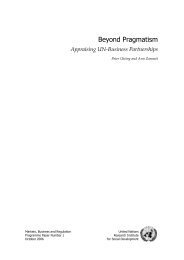communicating in the information society - United Nations Research ...
communicating in the information society - United Nations Research ...
communicating in the information society - United Nations Research ...
You also want an ePaper? Increase the reach of your titles
YUMPU automatically turns print PDFs into web optimized ePapers that Google loves.
What About Gender Issues <strong>in</strong> <strong>the</strong> Information Society?<br />
ICTs and women’s work<strong>in</strong>g lives<br />
ICTs offer new job opportunities for women <strong>in</strong> communication centers,<br />
telemarket<strong>in</strong>g, mobile telephones and <strong>the</strong> software <strong>in</strong>dustry. Thousands<br />
of women now work <strong>in</strong> data process<strong>in</strong>g, for example. Women also have<br />
good self-employment opportunities as teleworkers, us<strong>in</strong>g ICTs from<br />
<strong>the</strong>ir homes. In develop<strong>in</strong>g countries, ICTs even alter <strong>the</strong> pattern of<br />
production <strong>in</strong> <strong>the</strong> <strong>in</strong>formal sector, which recruits women <strong>in</strong> large<br />
numbers. Accord<strong>in</strong>g to a report from <strong>the</strong> International Labour Organization<br />
(ILO 2001), <strong>the</strong> role of women <strong>in</strong> <strong>the</strong> digital era is concentrated <strong>in</strong><br />
<strong>the</strong> area of <strong>in</strong>formation and onl<strong>in</strong>e work. Women’s <strong>in</strong>come <strong>in</strong> this new<br />
economy is higher than normal. However, gender discrim<strong>in</strong>ation exists,<br />
because men usually get <strong>the</strong> better positions and women carry out lessskilled<br />
tasks. The report notes that <strong>the</strong> diffusion of <strong>the</strong> technologies is<br />
accord<strong>in</strong>g to skills and <strong>the</strong>refore accompanied by ris<strong>in</strong>g wage <strong>in</strong>equalities.<br />
Although <strong>the</strong>re is pay <strong>in</strong>equality between those with ICT<br />
skills and those without, pay polarization also exists with<strong>in</strong> ICT use<br />
itself and this polarization is often gender-based.<br />
But <strong>the</strong> gap is also present among women <strong>the</strong>mselves. Class,<br />
education and age restra<strong>in</strong> most women from gett<strong>in</strong>g higher positions <strong>in</strong><br />
<strong>the</strong> ICT job market. Women also compla<strong>in</strong> about work<strong>in</strong>g conditions <strong>in</strong><br />
<strong>the</strong> area of telemarket<strong>in</strong>g, call centres and data banks, where <strong>the</strong>y are<br />
<strong>the</strong> majority. They are concerned about possible health hazards brought<br />
about by repetitive work <strong>in</strong> high-pressure work<strong>in</strong>g environments. And<br />
while wages and conditions of work <strong>in</strong> call centres appear to vary widely,<br />
<strong>the</strong> worst of <strong>the</strong>m have been called <strong>the</strong> “sweatshops of <strong>the</strong> digital era”.<br />
Telework<strong>in</strong>g has also raised some concerns. While it has created new<br />
employment opportunities for women, it could also have potential<br />
negative effects on <strong>the</strong> quality of work<strong>in</strong>g life. Women could f<strong>in</strong>d<br />
<strong>the</strong>mselves excluded from better career possibilities because, <strong>in</strong>stead of<br />
f<strong>in</strong>d<strong>in</strong>g a balance between family and paid work, <strong>the</strong>y could get caught <strong>in</strong><br />
a difficult situation with new demands on top of <strong>the</strong> old. The ILO report<br />
recommends <strong>the</strong> formulation of adequate policies to protect <strong>the</strong> labour<br />
rights of women workers <strong>in</strong> <strong>the</strong> ICT <strong>in</strong>dustry.<br />
When formulat<strong>in</strong>g policies on ICT work, <strong>the</strong> challenges that women<br />
face <strong>in</strong> adjust<strong>in</strong>g to <strong>the</strong> new demands, and <strong>the</strong>ir responses and organiz<strong>in</strong>g<br />
strategies when confronted with such challenges, should be taken<br />
<strong>in</strong>to account. Accord<strong>in</strong>g to Swasti Mitter (Mitter et al. 1995), radical<br />
th<strong>in</strong>k<strong>in</strong>g about tra<strong>in</strong><strong>in</strong>g <strong>in</strong> ICTs that takes <strong>in</strong>to account <strong>the</strong> obstacles<br />
that gender and class pose to a tra<strong>in</strong>ee will be essential <strong>in</strong> us<strong>in</strong>g human<br />
potential to <strong>the</strong> full. Women play an unconscious role <strong>in</strong> reproduc<strong>in</strong>g <strong>the</strong><br />
gendered nature of <strong>society</strong> and of <strong>the</strong> wider ICT sector. They still need to<br />
overcome <strong>in</strong>ternal barriers and conquer technophobia. In order to do this,<br />
women need to ma<strong>in</strong>ta<strong>in</strong> a political perspective (Hafk<strong>in</strong> 2002). However,<br />
important progress is be<strong>in</strong>g made <strong>in</strong> <strong>the</strong> “soft” side of technical<br />
23
















